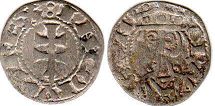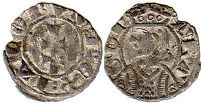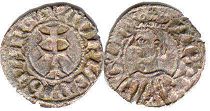Coins of Aragon - catalog with values
Kingdom of Aragon
Dinero=2 obol
Alfonso I the Battler (1104-1134)
 dinero no date
dinero no date
billon
TOLLETA
ANFVSREX
Coin value ~ 25-30 USD
James (Jaime) I the Conqueror (1213-1276)
 dinero no date
dinero no date
billon
IACOBVS REX
ARAGON
Coin value ~ 25-30 USD
 obol no date
obol no date
billon
IACOBVS REX
ARAGON
Coin value ~ 20-25 USD
James (Jaime) II the Fair (1291-1327)
 dinero no date
dinero no date
silver
IACOBVS REX
ARAGON
Coin value ~ 25-30 USD
Peter (Pedro) IV the Ceremonious (1335-1387)
 dinero no date
dinero no date
silver
PETRVS DI GRAREX
ARAGON
Coin value ~ 25-30 USD
Real=34 maravedi; Maravedi=2 dinero
Philip (Felipe) III (king of Spain as Philipp IV) (1598-1621)
 dinero no date
dinero no date
copper
ARAGONVM REX FECHA
PHILIPPVS III D G
Coin value ~ 10-15 USD
Charles (Carlos) II king of Spain (1665-1700)
 dinero 1678
dinero 1678
copper
ARAGONVM 1678
CAROLVS II D G
Coin value ~ 10-15 USD
Philipp (Felipe) IV (king of Spain as Philipp V) (1700-1746)
 dinero no date
dinero no date
copper
Coin value ~ 10-15 USD
Coins of other Spanish States
Barcelona
Castile and Leon
Catalonia
Gerona
Majorca
Navarra
Urgell
Valencia
Vic
Viscaya
Costs of Aragon coins in this catalog approximate and indicated specifically for the coin shown in the picture.
I do not buy or sell coins - this is just a catalog.

